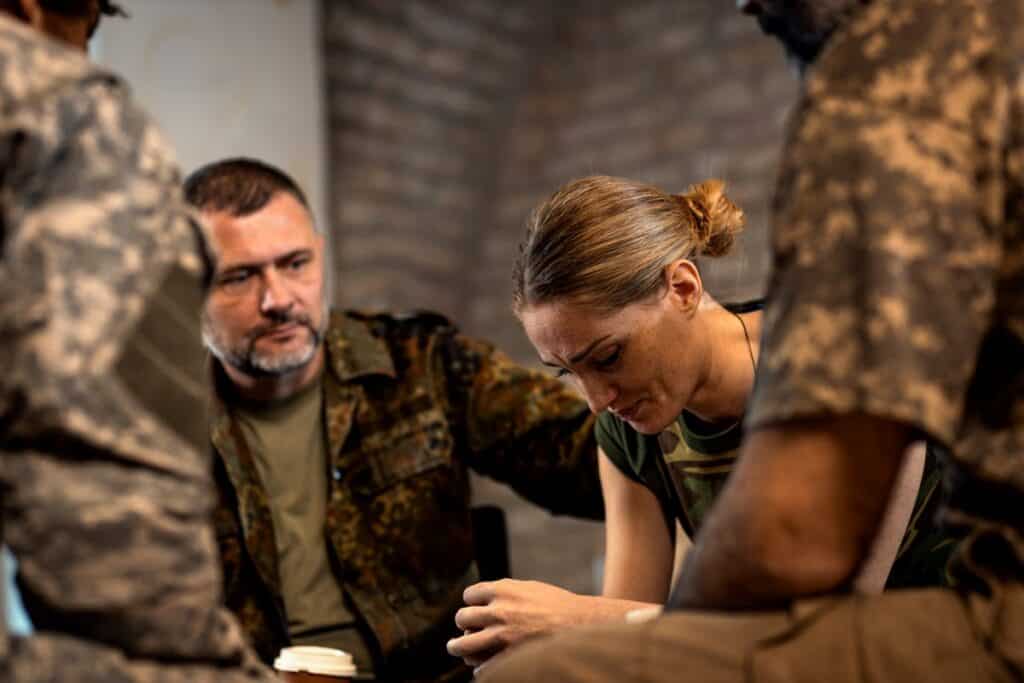Post-traumatic stress disorder (PTSD) affects millions of people worldwide, resulting from experiencing or witnessing traumatic events such as accidents, natural disasters, or combat situations.
Traditional therapies for PTSD often focus on individual cognitive-behavioral treatments, but group therapy has become a popular alternative due to its unique benefits and advantages.
Group therapy for PTSD involves bringing together individuals who share a common trauma experience, providing them with a supportive environment where they can work through their symptoms and gain valuable insights from one another.
Understanding PTSD and Trauma

Post-traumatic Stress Disorder (PTSD) is a mental health condition that may develop after a person experiences or witnesses a traumatic event, such as a natural disaster, a serious accident, or a violent assault.
Trauma refers to the emotional and psychological response to such events, which may include feelings of fear, sadness, and helplessness.
Symptoms of PTSD
Individuals with PTSD may experience a range of symptoms that impact their mental health.
Such symptoms may include:
- Intrusive thoughts or recurrent memories of the event
- Nightmares or flashbacks
- Avoidance of situations or stimuli that remind them of the event
- Negative changes in mood and cognition, such as feelings of guilt or detachment
- Increased arousal, such as irritability, difficulty sleeping, and hypervigilance
Diagnosis of PTSD
A healthcare provider will typically diagnose PTSD by performing a detailed assessment of the individual’s symptoms, history, and overall mental health.
Additionally, the symptoms must last for more than a month and cause significant distress or impairment in the person’s daily life for a diagnosis of PTSD to be confirmed.
Effect of PTSD on Relationships
PTSD can have a profound impact on an individual’s relationships with others.
The emotional and psychological changes associated with PTSD may lead to:
- Difficulty trusting others or a sense of isolation
- Strained communication between the affected individual and their loved ones
- Increased conflict or arguments in relationships
- Emotional withdrawal and a lack of engagement in social activities
By understanding PTSD and trauma, individuals can work with healthcare professionals to address their symptoms and improve their mental health and relationships.
What is PTSD Group Therapy?
PTSD Group Therapy is a form of therapeutic intervention specifically designed for individuals who have experienced trauma and are dealing with PTSD. Unlike individual therapy, group therapy involves a small group of individuals with similar experiences who come together to share their thoughts, feelings, and coping strategies related to trauma and PTSD.
In PTSD Group Therapy, individuals have the opportunity to connect with others who have faced similar challenges, fostering a sense of understanding and support. The group dynamic allows individuals to share their stories, express emotions, and learn from one another’s coping mechanisms.
Group therapy sessions are often facilitated by a trained therapist who guides discussions, provides psychoeducation, and facilitates activities to help group members process their trauma.
3 Types of Group Therapy for PTSD

Group therapy provides comfort and community and can be classified into three main types: psychoeducational groups, skills development groups, and peer support groups.
1. Psychoeducational Groups
Psychoeducational groups focus on educating individuals about PTSD. These groups aim to increase the participants’ understanding of the disorder, its causes, and coping mechanisms.
Participants are typically taught about the symptoms, triggers, and ways to manage the psychological impact of PTSD.
Psychoeducational groups often pave the way for other therapeutic interventions and normalize the experiences of those in the group.
2. Skills Development Groups
Skills development groups aim to equip individuals with coping strategies and practical skills to handle the challenges arising from PTSD.
These groups provide participants practical tools to manage anxiety, stress, and other disorder symptoms.
Techniques such as relaxation, distraction, and grounding are introduced as ways to deal with distressing emotions and regain control during difficult moments.
3. Peer Support Groups
Peer support groups provide a safe space for individuals with PTSD to share their experiences, thoughts, and feelings with others who have faced similar trauma.
Providing mutual support and comfort, these groups foster a sense of community that can be instrumental in the recovery process.
Through shared experiences and empathetic understanding, group members can develop group cohesiveness, promoting trust and emotional bonding.
In conclusion, PTSD group therapy offers various approaches and formats that cater to the diverse needs of trauma survivors.
Whether it’s learning more about PTSD, developing specific coping skills, or connecting with peers, group therapy can provide valuable support for individuals on their recovery journey.
4. Benefits of Group Therapy

Group therapy is a dynamic space where individuals facing similar challenges come together to share experiences, provide mutual support, and work collectively towards shared goals.
The advantages of group therapy are diverse, creating a supportive environment that fosters personal growth, emotional healing, and valuable insights.
1. Sense of Support
One of the main advantages is the sense of support it provides to the participants.
In a group setting, individuals can share their experiences and emotions, reducing feelings of isolation and promoting emotional healing.
Group therapy enables members to learn from the experiences of others and gain new perspectives on their own situation.
Therapists Specializing in Stress
2. Comfort
Another significant benefit is the comfort individuals can find in a safe, non-judgmental environment.
This atmosphere encourages open communication, emotional expression, and fosters trust among group members.
Participants can relate to each other’s experiences, reciprocate empathy and understanding, and find strength in their shared struggles.
3. Sense of Community
Group therapy also promotes a sense of community, whereby individuals can develop lasting relationships and socialize with others who have faced similar challenges.
Connection to peers with shared experiences can help in building resilience and assist in the recovery process.
Moreover, group therapy can provide valuable networking opportunities, enabling participants to connect with various resources that can aid them in their individual journeys.
4. Fosters Group Cohesiveness
Lastly, group therapy enhances group cohesiveness, which can lead to positive outcomes for individuals with PTSD.
The sense of belonging and unity developed in group therapy fosters mutual support, encouragement, and motivation towards achieving personal goals and overcoming trauma-related difficulties.
Frequently Asked Questions

Is group therapy effective for treating PTSD?
Yes, group therapy can be effective for treating PTSD.
It provides a supportive environment where individuals can share their experiences and learn from others who have gone through similar traumas.
However, the effectiveness of group therapy for PTSD may vary depending on the specific techniques used and the individuals involved.
What is the goal of group therapy for PTSD?
The primary goal of group therapy for PTSD is to help individuals process their traumatic experiences and learn coping strategies to manage symptoms like flashbacks, nightmares, and anxiety.
It also aims to assist patients in forming supportive connections with other group members, as well as helping them develop a sense of resilience and self-esteem.
Group therapy can also facilitate a better understanding of the impact of trauma on their lives and aid in developing trust and interpersonal skills.
How does group therapy help PTSD patients?
Group therapy can help PTSD patients in several ways.
First, it allows them to realize they are not alone in their struggles as they connect with others who have experienced similar traumas. This sense of shared experience can create a strong mutual support system and a feeling of belonging.
Second, the group setting provides a safe space for patients to openly discuss their feelings and experiences, which aids in processing the trauma.
Third, group therapy sessions expose patients to different coping strategies and perspectives, allowing them to learn from both the therapist and fellow group members.
What are common techniques used in PTSD group therapy?
There are various techniques used in PTSD group therapy.
One common approach is Cognitive-Behavioral Therapy (CBT), which helps patients recognize and change maladaptive thought patterns and behaviors.
Some practitioners also incorporate trauma-focused cognitive therapy, which specifically targets the traumatic experiences and memories.
Another technique is exposure therapy, where patients are gradually exposed to the thoughts, feelings, or situations they have been avoiding due to trauma.
In addition, some group therapy sessions may include relaxation techniques, like mindfulness or deep breathing exercises, to help patients manage stress and anxiety related to PTSD.
Each group therapy session will vary based on the therapist’s chosen approach and the specific needs of the group members.
How to find online group therapy for PTSD?
Finding online group therapy for post-traumatic stress disorder (PTSD) involves a few steps to locate a suitable and effective program.
Here’s a guide on how to find online group therapy for PTSD:
- Consult with a Mental Health Professional: If you’re already receiving treatment or have a therapist, start by consulting with them. They may be able to recommend online group therapy options that are well-suited to your needs.
- Telehealth Platforms: Some telehealth platforms and mental health apps offer access to online group therapy. Check popular platforms like Circles or Mindfulcare that offer group therapy options for PTSD.
- Check with Support Groups: Local or national PTSD support groups may also have information about online group therapy sessions. These groups often share resources and recommendations.
- Consult with VA Hospitals: If you are a veteran, consider reaching out to your local Veterans Affairs (VA) hospital or clinic. They often provide online group therapy options specifically tailored to veterans with PTSD.
When exploring online options, ensure that the platform used for therapy sessions is secure and complies with healthcare privacy regulations.








